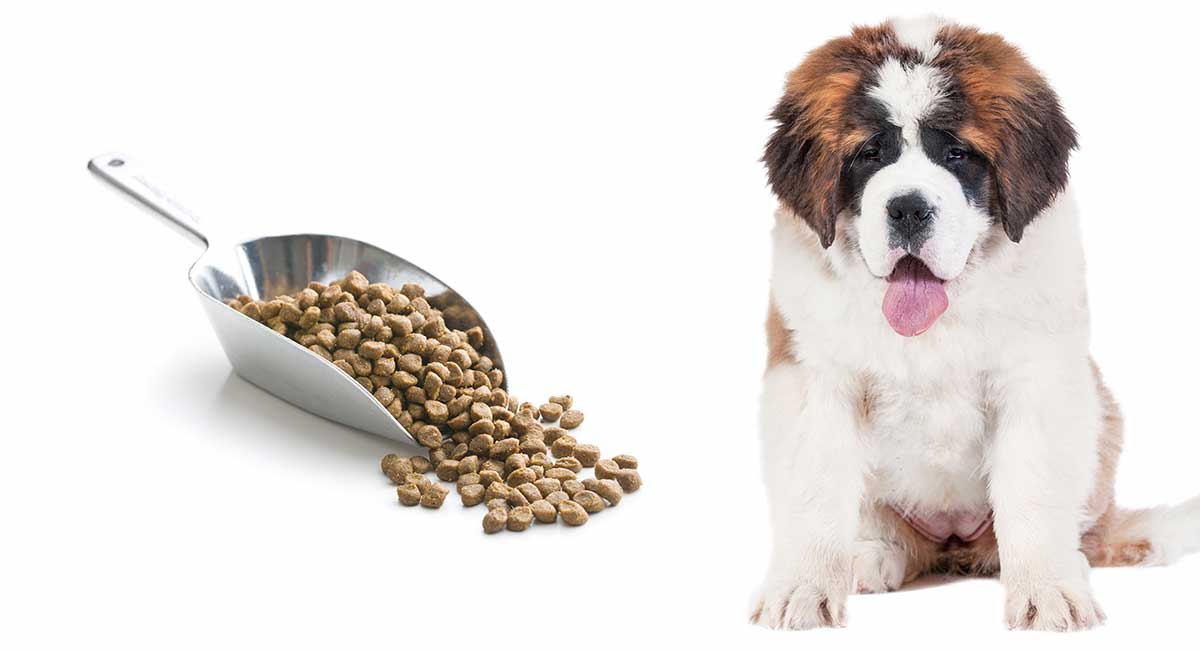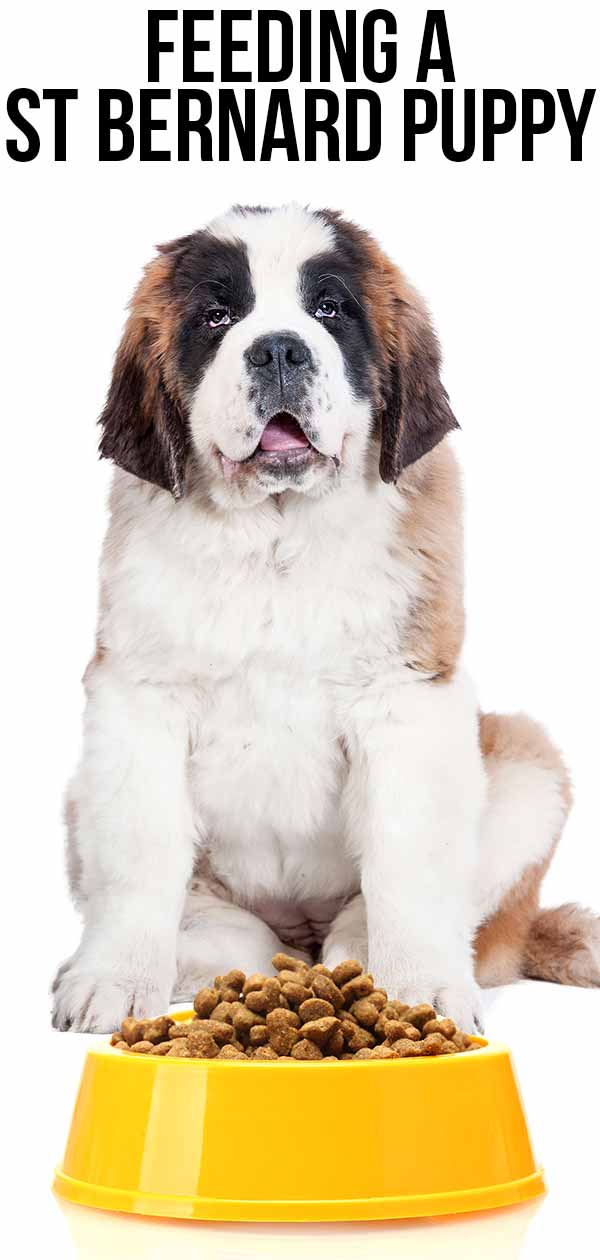
Feeding a St Bernard puppy too many daily calories, or a diet with too much protein and too little calcium, causes their bones to grow rapidly but lacking in strength and density. Choosing the right meals helps them grow strong bones, which can support their full adult weight. If you are thinking of bringing one of these gentle giants into your family, their diet needs careful consideration right from puppyhood.
Contents
Swapping Puppy Food Brands
When you bring your (big) bundle of fluff home, the breeder should have given you information on what they had been feeding the puppy up until this point.
Swap the food gradually, including a tiny proportion of the new kibble initially, increasing the proportions each day.
The whole process should take seven to ten days.
Your puppy may still experience some mild diarrhea as the food is swapped, which is normal.
Keep a close eye on it, and if it gets worse or puppy starts to vomit or lose interest in eating altogether, stop the transition and contact your vet for support.
St Bernard Puppy Diets
Being a giant breed, the needs of a growing St Bernard puppy are unique.
All too often, they are lumped in with ‘large breeds’, but St Bernards are larger than large!
Studies have shown that it is dangerous for giant breed dogs to grow too fast in their puppyhood.
Because these puppies have the capacity to grow so quickly, if they are provided with excessive nutrients over a short period, their bones grow too fast and lack the density and strength needed to support their weight as the dog matures.
You’re likely to encounter contradictory advice about whether excess protein or excess calories and the wrong proportion of calcium is the biggest culprit for too-rapid growth.
And as a result, the advice as to what diet to feed a St Bernard puppy is varied.
According to the St Bernard Club of America, a super-premium grade food that has no more than 25% protein is the best choice.
However, some veterinarians advise that feeding a large breed growth formula that has passed the AAFCO (American Animal Feed Control Officials) will ensure the correct growth rate, and portion control is the key to avoiding overnutrition. Enough food to keep a puppy in a lean yet healthy condition, or the amount that a puppy can eat in 10 minutes 3 times a day is recommended.
One thing both schools of thought agree on – if you are feeding your St Bernard pup a nutritionally complete diet, there should be no need to supplement their diet with vitamins.

How Feeding Changes as a St Bernard Puppy Gets Older
St Bernards reach physical maturity at around 18 months of age.
Another way to judge when to start feeding your dog an adult diet is when they reach around 90% of their expected adult weight.
It is at this point that the demands for nutrients and calories needed for growth slows down.
Now, attention needs to be given to keeping your young adult dog within a healthy weight range. This will help prevent injuries and illnesses throughout their lifetime.
According to the St Bernard Club, a diet of between 4 and 8 cups of food spread over the day in 2 or 3 meals is standard.
The size, activity level and condition of the dog, in conjunction with the quality of their food, will affect exactly how much you need to feed them.
Feeding a St Bernard Puppy Kibble
Pros
- Kibble is quick and convenient
- A high-quality kibble can provide your puppy with a nutritionally complete diet
Cons
- High in carbohydrates which could contribute to weight gain
- Some poor-quality options on the market
Peoples reservations regarding kibble include concerns that harmful chemicals are in the mix.
One such chemical is pentobarbital, an anesthetizing agent, which was reported to have been making its way into kibble.
The FDA investigated these claims. Ultimately, while pentobarbital was found in kibble, it was in very small amounts – not enough to cause any health concerns to pets.
Of course, you may want to investigate further if claims such as these concern you. However, ensuring the kibble you feed your dog has met relevant health and nutritional standards will go a long way to ensuring your dog will not suffer any ill effects from a kibble diet.
Feeding a St Bernard Puppy Wet Food
Pros
- On dry matter analysis, wet food contains more protein than kibble
- In many cases, less processed than kibble
Cons
- High water content, meaning your dog will eat more to feel satisfied
- More expensive than kibble
A concern that is often raised about canned food is that the dog’s teeth do not get cleaned as they do when fed kibble.
However, there are also concerns that kibble can damage a dog’s teeth due to its high carbohydrate content.
Of course, you always have the option of mixing the two to get the benefits of both.
If you are concerned about your pup’s dental health, offering them raw, meaty bones is one solution, which leads us to the next diet.
Feeding a St Bernard Puppy Raw (BARF)
Pros
- A more natural diet with fewer preservatives and less processing
- Eating raw meat and bones helps to keep teeth healthy
Cons
- Costly
- If not planned correctly, raw diets can be lacking in calcium and phosphorus, along with some other minerals.
Raw diets carry a significant risk of infectious disease. Both the human and animal family members are susceptible, particularly to salmonella infection.
Ultimately, there is limited research into the benefits and risks of a raw diet.
Solid knowledge of nutrition and careful planning is a must if you choose to feed your puppy a raw diet.
Practicing stringent food hygiene will lower the risk of contracting foodborne infections.
Feeding a St Bernard Puppy a Homemade Diet
As with raw diets, a homemade diet can be healthful if it is carefully planned and you have a sound knowledge of canine nutrition.
It cannot be stressed enough that as a giant breed that grows fast, getting the nutrition right while your St Bernard is a pup can have a great impact their health for the rest of their lives.
Aside from the knowledge, it takes to plan a nutritionally complete homemade diet, be sure to consider the cost both financially and time-wise.
Researching, planning and preparing a healthful homemade diet is truly a commitment.
How Much Should I Feed My St Bernard Puppy?
As each dog is different and will grow at different rates. It is impossible to provide exact amounts that a pup should be eating at each stage of their development.
Some state that when their puppy is full, they will stop eating, leaving a small amount in the bottom of the bowl.
However, many dogs lack this ability to self-regulate and will overindulge if left to their own devices. Particularly in giant breeds, allowing a pup to self-regulate could lead to overnutrition and its associated issues.
Usually, two or three pre-measured meals served at the same time each day is the best way to regulate the amount your pup consumes.
My Puppy Won’t Eat
Bringing a puppy home is a time of excitement and change, especially for your puppy. As a result, they may feel a little nervous and unsure.
Don’t change their diet, particularly in the first couple of weeks.
If you are changing foods and your puppy seems disinterested, there is a chance your puppy is picky and staging a protest.
There are some things you can try, like mixing in some wet food, some rice, soaking their kibble in water, or putting their food in a puzzle toy to pique their interest.
However, if your puppy has already skipped a meal and is showing no interest in the next despite your best efforts, a call to the vet is recommended.
If your pup is also lethargic, vomiting, unwell or showing signs of discomfort, consult the vet straight away.
While adult dogs have reserves of fat at the ready, puppies’ bodies are not as resilient, and a period of fasting for any reason can become serious quickly.
There is also a real chance your puppy has picked up an infection, sustained an injury, or suffers a condition that may have been undetected until now which is causing their disinterest in food. Clearly, any of these issues will need prompt medical attention.
My Puppy Is Still Hungry
Your puppy might seem capable of guzzling down food all day – they have a lot of growing to do!
But as we have learned, it is important that you don’t overfeed your St Bernard puppy as this could lead to growth that is too rapid and may also set them up for obesity later in life.
A diet is broken up into properly measured, smaller meals throughout the day will keep their nutrition on target.
It is also one way to prevent bloat in larger sized dogs.
How Long Is a St Bernard Considered A Puppy?
As with many large breeds, a St Bernard remains a puppy longer than smaller breeds. It can take up to three years for a St Bernard to reach full maturity.
However, for the purposes of feeding, your St Bernard pup is ready to be fed as an adult at around 18 months of age.

Preston Clowdus says
I have a new puppy. How much should I feed him daily. She is 8 weeks old.
Kai says
Three times a day. 2 cups of kibble divided by 3
Nanette says
No one gives the amount and that’s what I truly need to know. Just wanted a chart for the breed not impossible to find.
Peter says
I give my boy one large cup full 3 times a day. The cup is an oversized mug. This article says 4-8 cups per day .. A ” cup” is about 8oz
William O Brien says
Good article with lots of common sense. MY St Bernard named Master Sebastian lived just over 11 years. He was best and kindest dog I ever owned. He was strong, powerful and loved hanging round small people (children)
Angie P. says
May I ask what you fed your dog? Brand of food? I want to keep my boy healthy…… I’m anew owner and am looking for advice.
Sue says
I have a 5 month old St Bernad I also would like to know what you fed your dog
NIRAJ says
I read all the article care fully I love it.
Yuliia says
Great article. I think many are faced with a similar problem.